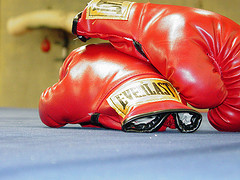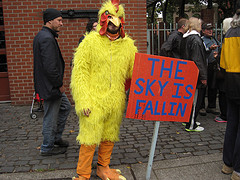Copyright 2007-25 Digital Media Law Project and respective authors. Except where otherwise noted,
content on this site is licensed under a Creative Commons Attribution-Noncommercial-ShareAlike 3.0 License: Details.
Use of this site is pursuant to our Terms of Use and Privacy Notice.
content on this site is licensed under a Creative Commons Attribution-Noncommercial-ShareAlike 3.0 License: Details.
Use of this site is pursuant to our Terms of Use and Privacy Notice.


 On March 12, 2013, the Federal Trade Commission released a new guidance paper entitled "
On March 12, 2013, the Federal Trade Commission released a new guidance paper entitled " I've already written several posts about the overblown predictions
that a
I've already written several posts about the overblown predictions
that a  A federal judge's ruling that a blogger was not covered by Oregon's reporters' shield law
A federal judge's ruling that a blogger was not covered by Oregon's reporters' shield law  On a motion for reconsideration, an Illinois trial judge who
On a motion for reconsideration, an Illinois trial judge who  Federal Judge Marco A. Hernandez got a lot of attention and cyberchatter late last year when he held that blogger
Federal Judge Marco A. Hernandez got a lot of attention and cyberchatter late last year when he held that blogger  A few weeks ago,
A few weeks ago,  Given the hoopla it caused
Given the hoopla it caused  There's been a lot of buzz online (and now
There's been a lot of buzz online (and now When web developer
When web developer 
Description:
Nadia Naffe accused a colleague of sexual assault and filed a criminal harassment complaint. John Patrick Frey, a Deputy District Attorney in Los Angeles County, raised questions about plaintiff's allegations on his blog and Twitter account which he maintained in his personal capacity. Naffe sued Frey, his wife, the former District Attorney for Los Angeles County and Los Angeles County under the theory that the defendant was acting in his official capacity as Deputy District Attorney while writing on his private blog, and that his actions violated her First Amendment and due process rights.
In a complaint filed in the U.S. District Court for the Central District of California, Naffe asserted the following causes of action:
1. violations of 42 U.S.C. § 1983
2. public disclosure invasion of privacy
3. false light invasion of privacy
4. defamation
5. intentional infliction of emotional distress
6. negligence
7. negligent supervision
Naffe subsequently filed a First Amended Complaint naming only Frey and the County as defendant. Frey moved to dismiss the First Amended Complaint, both for failure to state a claim (as to counts 1-6) and for a lack of subject matter jurisdiction over the state law claims (counts 2-7); the County filed its own motion to dismiss and also joined Frey's motions. Frey also filed a special motion to dismiss the state law claims under California's anti-SLAPP law. Naffe opposed all four motions.
In a tentative ruling (later confirmed), the district court found that it did not have independent subject matter jurisdiction over Naffe's state law claims because she had not sufficiently demonstrated a claim for relief exceeding the sum of $75,000. Accordingly, the court focused on whether Naffe had properly asserted a claim under 42 U.S.C. § 1983.
The court held that to state a claim under Section 1983, Naffe was required to allege facts sufficient to show that Frey's action related in some meaningful way either to his governmental status or to the performance of his duties, but found that Naffe had merely offered allegations that were conclusory or speculative. The court further held that merely "mentioning the fact that [Frey] [wa]s a deputy district attorney or prosecutor... does not transform everything he says on his blog or on Twitter into state action." Accordingly, the court dismissed Naffe's Section 1983 claim without leave to amend and dismissed her state law claims without prejudice. The court did not address the merits of Frey's anti-SLAPP motion.
Naffe appealed the ruling to the United States Court of Appeals for the Ninth Circuit. In her appellate brief, Naffe focused on a comment Frey had made on his twitter account, in which he states: "@NadiaNaffe My first task is learning what criminal statutes, if any, you have admitted violating." Naffe interprets this tweet to be a threat by a state prosecutor to investigate her for alleged criminal violations and offers it as evidence that her allegations are not merely speculative. Frey, in his appellee's brief, responded that such musings could not be deemed an official act, and that the factual context proves that the comment had nothing to do with anything over which a Los Angeles County Deputy District Attorney such as Frey could have jurisdiction.
The Digital Media Law Project ("DMLP") filed an amicus brief in support of Frey arguing that there are over 20 million Americans working for the government and that, even when those individuals speak on matters that relate to government activity, their ability to speak in their personal capacities must be preserved in order to ensure that these individuals' valuable viewpoints are part of public discussion.